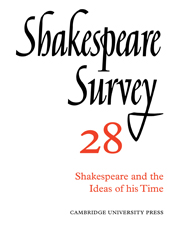Book contents
- Frontmatter
- ‘Richard II’ and the Realities of Power
- The Politics of Corruption in Shakespeare’s England
- Literature without Philosophy: ‘Antony and Cleopatra’
- Self-consciousness in Montaigne and Shakespeare
- ‘Measure for Measure’: The Bed-trick
- Shakespeare and the Doctrine of the Unity of Time
- ‘Coriolanus’ and the Body Politic
- ‘Titus Andronicus’, iii, i, 298–9
- ‘The Merchant of Venice’ and the Pattern of Romantic Comedy
- The Integrity of ‘Measure for Measure’
- ‘To Say One’: An Essay on ‘Hamlet’
- ‘The Tempest’ and King James’s ‘Daemonologie’
- Sight-lines in a Conjectural Reconstruction of an Elizabethan Playhouse
- The Smallest Season: The Royal Shakespeare Company at Stratford in 1974
- The Year's Contributions to Shakespearian Study 1 Critical Studies
- 2 Shakespeare’s Life, Times, and Stage
- 3 Textual Studies
- Index
- Plate section
The Smallest Season: The Royal Shakespeare Company at Stratford in 1974
Published online by Cambridge University Press: 28 March 2007
- Frontmatter
- ‘Richard II’ and the Realities of Power
- The Politics of Corruption in Shakespeare’s England
- Literature without Philosophy: ‘Antony and Cleopatra’
- Self-consciousness in Montaigne and Shakespeare
- ‘Measure for Measure’: The Bed-trick
- Shakespeare and the Doctrine of the Unity of Time
- ‘Coriolanus’ and the Body Politic
- ‘Titus Andronicus’, iii, i, 298–9
- ‘The Merchant of Venice’ and the Pattern of Romantic Comedy
- The Integrity of ‘Measure for Measure’
- ‘To Say One’: An Essay on ‘Hamlet’
- ‘The Tempest’ and King James’s ‘Daemonologie’
- Sight-lines in a Conjectural Reconstruction of an Elizabethan Playhouse
- The Smallest Season: The Royal Shakespeare Company at Stratford in 1974
- The Year's Contributions to Shakespearian Study 1 Critical Studies
- 2 Shakespeare’s Life, Times, and Stage
- 3 Textual Studies
- Index
- Plate section
Summary
The Royal Shakespeare Company has shifted its centre. Even before the completion of the Barbican Theatre, it has become a London company with a branch in Stratford. I record this progress with sadness and some sense of outrage. The British theatre is in a state of confusion, certainly, and we must expect some drawing in of horns when rising costs of materials coincide with falling attendance, an imminent increase in the actor’s minimum wage, and a subsidy crisis. But at Stratford?
On 13 June 1974 The Stage announced in a headline 'RSC Biggest Season: Twenty-three projects in six months '.It was reporting a pressrelease from Trevor Nunn giving his plans for the second half of 1974, 'the most ambitious six months in the company's history'. Of these projects, the main theatre at Stratford housed three, Twelfth Night (opened 22 August), Measure for Measure (opened 4 September), and Macbeth (opened in November, too late for review here, and too late also for a large part of Stratford's traditional audience). Four were scheduled for performance at The Other Place, a 140-seat theatre/studio, which has offered a largely non-Shakespearian programme on occasional nights throughout the season. Of the remaining sixteen, nine were on show in London, five were 'on tour', and two were untraceable. The Arts Council subsidy for 1974-5 amounted to £450,000, 'about onefifth', the programme told us, 'of the company's costs for that year'.
- Type
- Chapter
- Information
- Shakespeare Survey , pp. 137 - 148Publisher: Cambridge University PressPrint publication year: 1975

